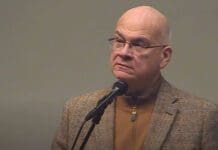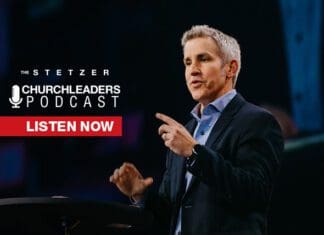Si Robertson Pays Moving Tribute to Brother Phil, Encourages People To See ‘The Blind’
Si Robertson, the brother of the late “Duck Dynasty” patriarch Phil Robertson, posted a moving tribute to Phil on Instagram Saturday, Aug. 30.
Forrest Frank and Cory Asbury’s Public Apology Inspires Boy To Forgive School Bully
The online exchange between Christian musicians Forrest Frank and Cory Asbury has inspired a kid to forgive his school bully.
‘Outlier’ Erwin McManus Talks to Lecrae About Outside-the-Box Christianity
On the “Deep End With Lecrae,” Pastor Erwin McManus talked about being misunderstood, dealing with the pressure of fame, making church relevant today, and maximizing people’s uniqueness.
‘I Almost Didn’t Do This for Fear of Being Misunderstood’—Tauren Wells Stops Concert To Pray for Crowder
Christian artist Tauren Wells agreed to step in for the recently injured David Crowder and play a concert, praying for Crowder during the show.
Grace Community Church Accused of Exposing Workers to Asbestos, Wrongfully Terminating Them
Three former employees are accusing Grace Community Church of wrongfully terminating them after they complained of asbestos exposure.
New Study Shows Gen Z and Millennials Are Now the Most Regular Churchgoers
For the first time in decades, younger adults, specifically Gen Z and Millennials, are now the most regular churchgoers, surpassing older generations who have traditionally led in church attendance.
Christian Football Players in the NFL: More Faith-Filled Athletes
Not all Christian football players in the NFL are household names…yet. Here are other football players who glorify God, both on and off the field.
Russell Moore Says His Desire for Divine Judgment on Trump ‘Is of the Devil’
Dr. Russell Moore recently shared an open letter to President Donald Trump in reaction to Trump's remarks about getting into heaven.
Pastor Greg Laurie Gives Recovery Update: ‘I’m Not Using a Cane or a Walker’
Nearly two weeks after having hip replacement surgery, Pastor Greg Laurie told his social media followers that the surgery was “100% successful.”
‘Music Will Always Be a Part of My Life’—Artist John Mark McMillan Announces Final Tour
After 20 years writing, recording, and touring, Christian singer John Mark McMillan has announced that this fall is his last tour.
Top Articles
12 NFL Players Who LOVE Jesus (and Football)
Here's our latest list of notable Christian football players. These outspoken NFL players are strong in their faith and are not afraid to share their Christian beliefs.
12 Things Pastors Cannot Do
There are 12 things a church pastor cannot do. Pastors are amazing people and, in faith, they can do a lot...just not these things.
12 Habits That Lead to Divorce, and How to Avoid Them!
No one intends to develop these habits that lead to divorce. In fact, every married couple has exchanged vows which promise “til death do us part,” but for far too many marriages, their dreams of “forever” are crushed by divorce.
Can a Christian Drink Alcohol?
Can a Christian drink alcohol? I have yet to hear from anyone who drinks say how alcohol enhances anything or blesses anyone.
Tim Keller: 3 Questions Fake Christians Can’t Answer
There are several questions that fake Christians won't be able to answer. According to Tim Keller, these are questions that focus on hallmarks of a growing relationship with God.
LATEST ARTICLES
Join our community and be part of the conversation.
To subscribe, simply enter your email address on our website or click the subscribe button below. Don't worry, we respect your privacy and won't spam your inbox. Your information is safe with us.
Get emails and offers from ChurchLeaders.com. Privacy
































